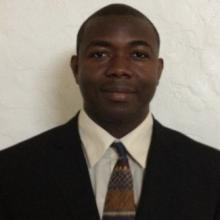“I want to be able to do something and contribute to the defense of our infrastructure,” says Emmanuel Onwulata. He’s a master’s student in cyber and information security at Capitol Technology University, and one of two Capitol master’s students to be selected this year for the prestigious Information Assurance Scholarship Program.
The award “gives me the opportunity to do cybersecurity research, which I love with a passion,” Onwulata says. It’s a critical field nowadays, he adds, because of “the current situation, where a lot of systems are being hacked due to inadequate protections and controls.”
Onwulata and Josh Nelbach are Capitol’s IASP recipients for 2017. Selection for the Department of Defense sponsored program results in a full scholarship package including tuition coverage as well as a $30,000 stipend. After graduation, recipients go on to cybersecurity roles in the federal government.
Nelbach says he is “extremely grateful” to have been selected. Like Onwulata, he sees it as an opportunity to serve the country as it grapples with an increasingly complex array of cybersecurity threats.
“It’s an investment by the American people in their own security. America is investing in me by ensuring I can gain the best education I can in order to defend our nation,” Nelbach said.
Capitol, a pioneer in the field of cybersecurity education and a designated Center for Academic Excellence (CAE) in the field, has also announced this year’s recipients of the school’s Cyber Transfer Scholarship Program, which is awarded to community college students seeking to complete bachelor’s degrees in cybersecurity. The CTSP is funded under a grant from the National Science Foundation (NSF).
Andrew Brant (Northern Virginia CC), Willie F Brown (Delta College), Matthew Harris (Volunteer State CC), Brad Howell (Volunteer State CC), Shelly Kleinert (Volunteer State CC), Nathan Little (Delta College), Justin Scheidler (Delta College), Jonathan Taylor (Prince Georges CC), and Jonathan Varner (Augusta Technical CC) will receive the CTSP scholarship, which covers the classes needed to move from an associate’s to a bachelor’s degree. Coursework for CTSP students is offered online, enabling them to earn their degrees without relocation.
Scholarship programs such as the IASP and CTSP not only open doors to students but also help ensure that the country has a corps of well-educated professionals in a critical field, said Dr. William Butler, who chairs the cybersecurity program at Capitol.
The university was among the first to offer academic degrees in the field, including a doctorate established in 2010, he noted.
“Capitol has well-established relationships with employers and government agencies, and we’re an NSA-designated Center for Excellence,” said Butler, who also directs the school’s Critical Infrastructures and Cyber Protection Center. “Our faculty consists of professionals working in the field. They can provide insights and exposure to current trends that the students won’t get elsewhere. As a result, a Capitol education increases students’ chances of success as well as their earning potential.”




